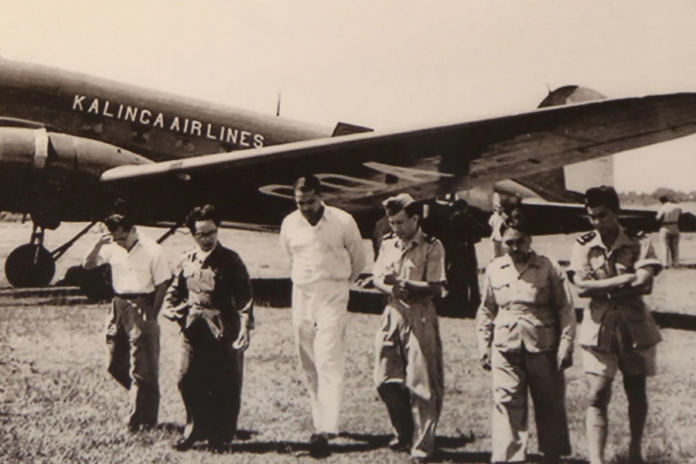
The role played by an Indian military pilot in influencing the current politics of the largest archipelago nation in the world must be recognised as Prime Minister Narendra Modi travels to Indonesia.
Indonesia and India have been allies since the latter’s independence when an Indian pilot saved the country’s key officials from Dutch colonialists.
This challenging rescue was the brainchild of a daredevil pilot who later became a politician. A colourful young man from Odisha named Biju Patnaik served in the Royal Air Force as a pilot.
His involvement in the fight for Indian independence drew him closer to Jawaharlal Nehru, who in 1946 led an interim administration to help British India become an independent nation.
The Indonesian Embassy in New Delhi had a room set aside for the young pilot as well.
Indonesia was battling to free itself from Dutch colonialists at the same time. Indonesia was a colony of the Netherlands before to World War II, and the imperial authorities possessed substantial wealth.
Japan assumed control of the nation throughout the war. But as the war went on and Japan’s fortunes weakened, the Japanese government decided to give up its hold on the island country.
On August 17, 1945, Indonesian independence was proclaimed by Sukarno and Mohammad Hatta, two days after the Japanese surrendered. Sukarno was elected president the following day, on August 18, and Hatta was appointed as vice president.
Sukarno established Indonesia’s new government and named Dr. Sjahrir as prime minister. Dr. Sukarno’s dependable lieutenant Sjahrir made friends with Nehru.
The Dutch sought to regain their economic interests in Indonesia after the Japanese were driven out. To prevent the entry of weaponry into the nation, the Indonesian Sea was barred.
Despite the fact that colonialism is no longer popular with Westerners, the Indonesian freedom struggle was mostly considered to be a Dutch domestic issue. By recognising the Sukarno administration in Indonesia and bringing the matter up in the UN, Nehru intervened to support the Indonesian freedom struggle.
On August 17, 1946, the Republic of Indonesia celebrated its first anniversary. Nehru publicly hailed the country and announced plans to host the Asian Relations Conference (ARC) in New Delhi.
Sukarno was overjoyed by this morale boost and gave the order to fly the Indian tricolour alongside the Indonesian merah putih during the anniversary celebrations in Yogyakarta.
Sukarno even wrote to Nehru on August 19, 1946, saying, “Your country and your people are linked to us by ties of blood and culture, which date back to the very beginning of history. The word ‘India’ must be a part of our life, for it forms the first two syllables of the name we have chosen for our land and race — the ‘Indo’ in Indonesia.”
Flight Of Freedom for Indonesia’s freedom fighters
Nehru deemed the cause of Indonesian independence to be crucial, and he requested Biju Patnaik’s assistance in aiding the island nation’s liberation warriors.
By “surreptitiously” transporting Indian independence militants to various towns, Patnaik had made it possible for them to avoid the British. As a member of the British Indian Army, the gallant Patnaik also air-dropped flyers about the Quit India Movement for Indian soldiers engaged in combat inside Myanmar.
These abilities were put to the test when Patnaik flew a Douglas C-47 Dakota carrying supplies to Indonesian insurgents while skilfully avoiding Dutch-imposed land and sea blockades.
The aircraft would depart from Kolkata and stop at Singapore and Mohanbari, which is in the modern-day state of Assam, for refuelling. He went on a few of these covert flights with his pilot wife, Gyana Devi.
By July 1947, the island nation was under Dutch siege. PM Sjahrir was placed under house arrest by the Dutch forces in Jakarta after being given the go-ahead by President Sukarno to leave the nation and rally support for their demand for freedom.
Patnaik was summoned by Nehru, who was closely monitoring the situation in Indonesia, and ordered to save the vice president and prime minister of Indonesia, Hatta, from the hands of Dutch forces. The handsome young pilot Patnaik accepted the assignment without hesitation.
The “resistance” Republican leadership led by Sukarno grew in Yogyakarta as part of Biju Patnaik’s missions after Dutch soldiers launched “Operation Product” on July 20, 1947, to seize Jakarta.
On July 21, 1947, Patnaik arrived in Jakarta while evading Dutch aviation observation. On July 24, 1947, the daring couple Patnaik and Gyana Devi flew Hatta and Sjahrir from a jungle refuge in Indonesia to India through Singapore despite a Dutch order to shoot the plane down.
Patnaik replied to the direct Dutch threat: “Resurgent India does not recognize Dutch colonial sovereignty over the Indonesian people. If my aircraft is shot down, every Dutch plane flying across the Indian skies will be shot down in retaliation.”
During the operation, Dutch Mustang fighters bombed the airstrip where Patnaik’s jet had landed, but an engineer managed to hide the aircraft and spare Patnaik’s life. He was caught in another air raid at an oil dump the following day and “had to run 300 yards for cover as the Dutch [planes] strafed it,” according to a story written by a Singaporean journalist.
After his heroic rescue, Prime Minister Sjahrir spoke to the world from India and informed them of Indonesia’s situation as the Dutch attempted to recolonize the nation they had awarded independence to in 1945.
Patnaik travelled to Indonesia in 1947 for more than two weeks to teach pilots there, according to Peristiwa Heroik, July 29, 1947, a book compiled by the Sub-Service of History, Public Relations and Media Directorate of the Indonesian Air Force.
Patnaik received honorary citizenship in Indonesia and the “Bhoomi Putra” (son of the land) award in recognition of his bravery. When Indonesia celebrated its 50th anniversary of independence in 1995, he was also given the greatest honour bestowed upon the nation, the “Bintang Jasa Utama.”
The relationship Patnaik has with Indonesia also had a personal touch. President Sukarno’s daughter Megawati, who would later lead Indonesia, was given that name thanks to his influence.



